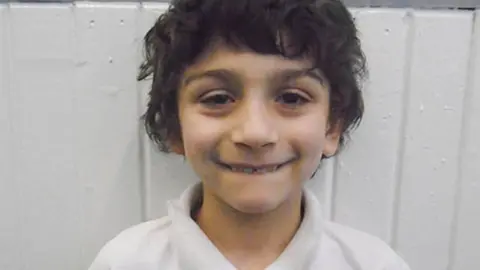Hakeem Hussain: The needless death of a neglected boy
 Family
FamilyClutching a leaf in his hand, Hakeem Hussain died alone in freezing temperatures aged just seven years old.
His body was found not at home, but an address in Birmingham where his mother had been staying more and more, as she increasingly relied on class A drugs.
For years, Hakeem had been struggling with severe asthma and rather than care for him, Laura Heath let him die.
The night of his death in 2017, after smoking heroin in the other room, she failed to stir as he gasped for breath.
Warning - this article contains distressing content.
His freezing body was found outside the flat on Cook Street in Nechells shortly after 07:30 GMT on the morning of 26 November.
It is possible Hakeem had already been dead for as long as seven hours.
 Facebook
FacebookAfter a crown court trial in Coventry, 40-year-old Heath was found guilty of his manslaughter by way of gross negligence. She has now been jailed for 20 years.
She had previously admitted four counts of child cruelty.
Attention will now turn to local authorities who have serious questions to answer as to how a boy they knew was at risk came to die from an easily treatable condition, while his mother, high on drugs, slept nearby.
A serious case review examining the circumstances of his death is due to be published over the next couple of months.
Hakeem, a loving child who was talented in music and arts, lived alone with Heath after his father was jailed in 2016.
He was one of four children Heath had, but Hakeem's three half-siblings had all been removed from her care.
He was a normal and healthy child until 2013, when he developed asthma symptoms for which he had to be hospitalised three times.
Heath was familiar with his condition - she had accompanied him on his hospital stays and doctors and nurses had repeatedly discussed with her how to manage his condition.
There was a consensus among independent medical experts at Heath's trial: Hakeem's asthma was not unmanageable, she simply failed to manage it. Had she cared for him properly, jurors heard, the boy would not have died.
But she did not care about her youngest son, or if she did, his needs were secondary to her addiction, the court heard.
Such was the scale of neglect that police officers found Hakeem's inhalers were used not to ease his breathing, but as a makeshift crack pipe for his mother.
 West Midlands Police
West Midlands PoliceAt the time of her son's death, Heath was spending £55 every day on drugs. This would buy her up to six bags of heroin and crack cocaine, which she would smoke on a daily basis.
She told police Hakeem would ask her to stop, that she knew it was detrimental to his health, but still she continued.
To pay for it, she relied on sex work and deceiving friends and family, telling them she needed money to pay for the gas and electric, which had been cut off in October at their address one street away on Long Acre.
All the while, Hakeem was left to suffer. He missed school, he missed meals, and was forced to live in conditions investigators described as "extremely untidy and unclean".
 West Midlands Police
West Midlands PoliceThe boy was known to authorities and was subject to a Child Protection Plan. Just days before his body was found, a nurse at his school correctly predicted he would die if action was not taken.
Hakeem went to bed at about 22:00 the night he died. His mother smoked some more before joining him in the same bed and passing out.
It's not known what happened next, but at some point, likely exacerbated by the second-hand smoke, Hakeem's breathing became laboured.
He had not been able to access his preventative inhaler for two days as it was left uncollected by his mother at his home on Long Acre.

If you have been affected by any of these issues in this story you can visit BBC Action Line.

Furthermore, it's not clear whether Hakeem would have been able to access another inhaler for relief. Investigators found no functioning spacer device at the flat and only two disassembled inhaler components.
"If he was stressed or upset, this would have worsened his breathing," Dr Martin Samuels, a consultant paediatrician, told jurors.
"All this could have taken place over a matter of minutes to an hour or two and would have been accompanied by severe respiratory distress to the point that he may not have been able to call for help."
Unable to rouse his mother and in a bid to ease his symptoms, it is thought he went outside for fresh air, where he was found the next morning.

Analysis
By Phil Mackie, BBC Midlands correspondent
Hakeem wasn't just failed by his mother, but also by the agencies who knew he was at risk.
Looking after vulnerable children in a city with an estimated population of 1.2 million is an almost impossible task: Birmingham Children's Trust, appointed six months after Hakeem's death, has about 13,000 families on its books.
In the decade before Hakeem's death, the city council also had to deal with austerity measures that saw budgets and staff numbers significantly cut. It also had major problems with staff recruitment and retention.
I was told by one of the many directors who came and went during this period that there were lots of great social workers living in Birmingham, the trouble was that many didn't want to work there and were commuting outside of the city to work.
 West Midlands Police/ PA Media
West Midlands Police/ PA MediaWhen the safeguarding review is published into Hakeem's death, I would expect it to reach many of the same conclusions that we've seen in other reviews into children's deaths, not just in Birmingham but across the country.
It's likely to highlight failures in communication between different agencies, in particular how some information about Hakeem and his mother wasn't shared.
But there's a bigger issue which is beyond the review's remit. Why did it take so long for Birmingham Children's Trust to take over from the city council, which had been rated inadequate for so long?

Jurors agreed with the prosecution's case that Hakeem need not have died. Had his mother, formerly of Long Acre, Nechells, fulfilled her duty of care to manage his condition, he would still be alive.
After his death, his teachers at Nechells E-ACT Academy described him as "a most beautiful little boy".
He was especially remembered for his infectious giggle and show-stealing performance as the Christmas star in a nativity play.
"Drugs came before everything else," Jonas Hankin, prosecuting, said of Hakeem's mother.
"She was not incapable of helping Hakeem, she simply chose not to prioritise him."

Follow BBC West Midlands on Facebook, Twitter and Instagram. Send your story ideas to: [email protected]
